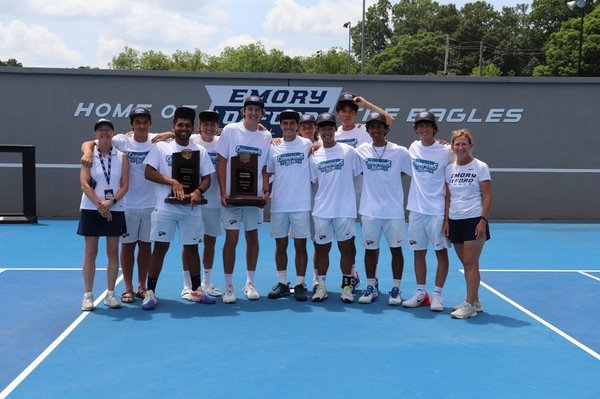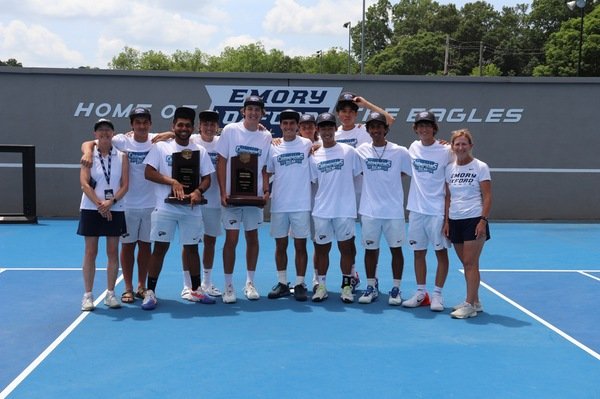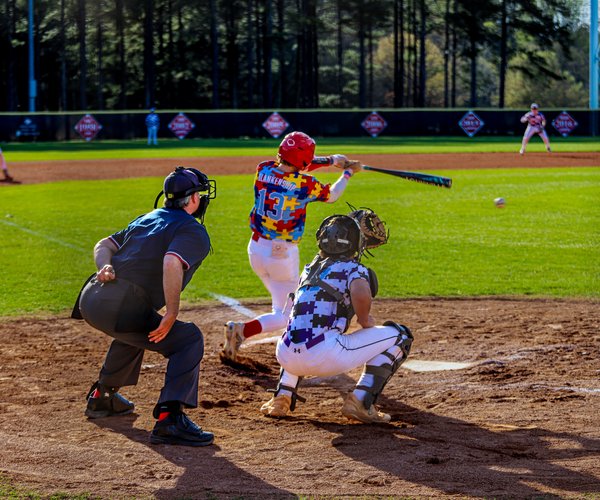OXFORD, Ga. — On May 13, the Emory at Oxford men’s tennis squad captured its seventh consecutive national title. It was the program’s 10th overall, too.
Zach Ravel, Tyler Yamato-Chang, Jahaan Sachdeva, Aerie Golubenko, Alex Szymanski, Anders Orr, Ryan Talano, Oliver Catanzaro, Mark Li and Sheryar Lakhani were the 10 players who carried the Eagles to the title.
Ina Jones served as the team’s interim head coach after head coach Pernilla Hardin had to step down due to her battle with cancer.
In an interview with The Covington News, Jones described how the team’s attitude toward winning it all for Hardin played a part in the championship quest.
What was the moment like winning the most recent national championship?
IJ: That’s a real complicated question this year, because I’ve been with coach Hardin for most of them. But this year without coach Hardin, it was sort of muted for me, but exciting at the same time that we were able to do it even though she wasn’t there.
I was excited for our guys this year particularly this year, because all 10 got to play and all 10 are national champions. That was particularly meaningful for me. We actually knew that we had clinched on Saturday. We just had to win our finals on Sunday for them to be champions individually. But we knew as a team they had already won.
For the guys, I was really, really excited. We wanted to do it for coach Hardin since she couldn’t be there with us.
How much of ‘doing it for coach Hardin’ was motivation for the team?
IJ: The role it played in it was that those guys all had her in their head. They could hear what she would be saying. I had just to remind them about several things they needed to remember. It definitely played a part.
It was a difficult year for them, too. They knew she was sick and they cared a lot for her. It was emotional at times.
Coach, you’ve been a part of four of the seven straight national titles…Does this one mean a little bit more because of ‘doing it for coach Hardin?’
IJ: For me it was, because we had to do it without her and it was hard. I told her, ‘This is not what I wanted to do.’ I liked being her assistant. I liked her telling me what to do. This was a totally different experience for me feeling the pressure.
Gwen, who was my assistant and just as much of a head coach as I was, we did it together. We shared the responsibility. She was great. We just soldiered on, we prayed a lot and did the best we could with the guys. It was a hard year for us. We’re not used to doing all that. Coach Hardin usually handled all that and I just did what she told me to do.
I’d go talk to her and she’d say, ‘You have to be me’ and I’m like, ‘I can’t be you.’ When she said that, she meant I had to tell them the hard things. Like, ‘You aren’t going to do this. You’re going to do what we tell you to do’ sort of thing. And we had a great group of guys, so it was good.
What makes the men’s tennis program at Emory at Oxford such a special program?
IJ: For coach Hardin, she put a lot of effort and time into recruitment and making sure these men were not just good tennis players, but they were men capable on and off the court. Being gentlemen, to be kind, handle themselves on the court, learn to handle their emotions. To her, it was all about the whole person. It wasn’t just tennis on a tennis court.
And she lived by saying, while she fought her cancer, it was ‘One day at a time.’ And they’re on the court, they got to play one point at a time. It wasn’t about winning. It was about going out there and doing your best.
I think that’s what makes it so great. First, she was really careful who she recruited. When I say, I don’t mean she always knew they were the best player around. It was just somebody who was coachable and that wanted to grow as a person.
I can’t underestimate her faith and mine as being a huge part of it and Gwen as well. Praying for these boys that they will do their best. They knew where we stood. We didn’t preach to them, but when they were on the court, they were supposed to come play and have fun. When they walked onto that court, they were to leave their studies, all their girl problems, everything behind and were to come out and play. It was a time to play.
Now, we worked hard. But they were to work hard and have fun while they did it. She was really good at making it fun.









